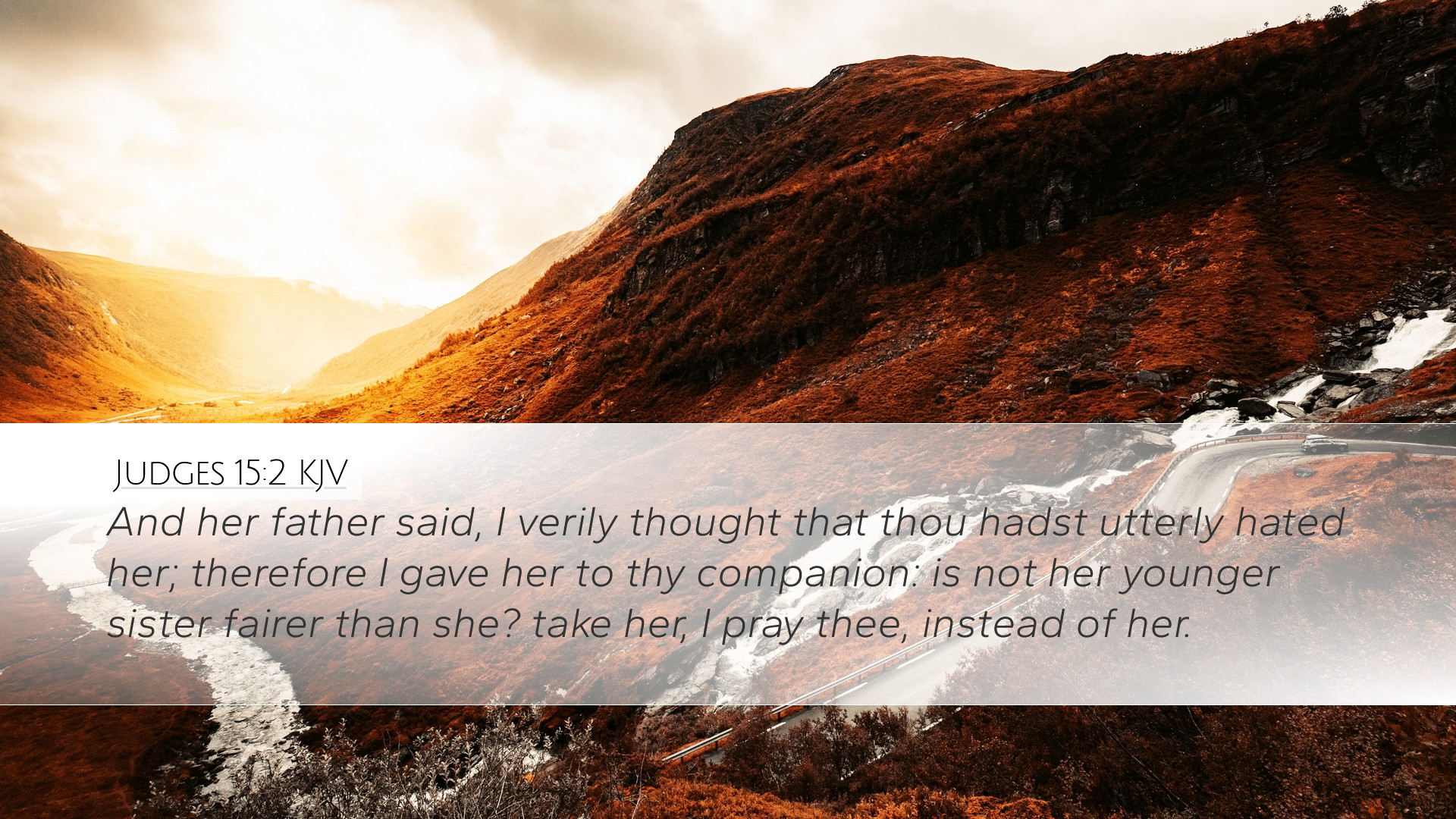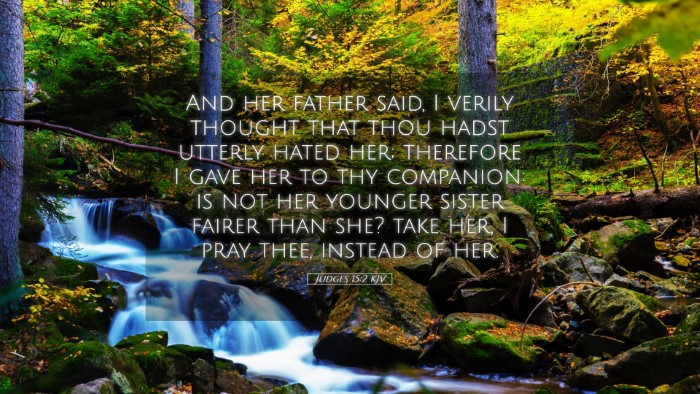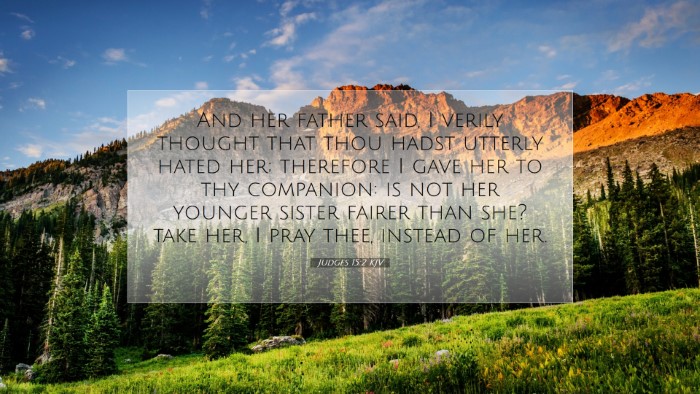Old Testament
Genesis Exodus Leviticus Numbers Deuteronomy Joshua Judges Ruth 1 Samuel 2 Samuel 1 Kings 2 Kings 1 Chronicles 2 Chronicles Ezra Nehemiah Esther Job Psalms Proverbs Ecclesiastes Song of Solomon Isaiah Jeremiah Lamentations Ezekiel Daniel Hosea Joel Amos Obadiah Jonah Micah Nahum Habakkuk Zephaniah Haggai Zechariah MalachiJudges 15:2
Judges 15:2 KJV
And her father said, I verily thought that thou hadst utterly hated her; therefore I gave her to thy companion: is not her younger sister fairer than she? take her, I pray thee, instead of her.
Judges 15:2 Bible Commentary
Commentary on Judges 15:2
Judges 15:2 states: "And her father said, I verily thought that thou hadst utterly hated her; therefore I gave her to thy companion: is not her younger sister fairer than she? take her, I pray thee, instead of her." This passage occurs within the narrative of Samson's tumultuous relationships and serves as a pivotal moment in understanding the complexities of his character, his cultural context, and the resulting spiritual implications.
Contextual Background
In order to fully appreciate the implications of Judges 15:2, it is essential to consider the surrounding context. Samson, one of the judges of Israel, was known for his physical strength and his troubling relationships with women, particularly with Philistines. This verse follows a sequence of events that includes his marriage to a Philistine woman and a subsequent betrayal that leads to conflict.
Insights from Matthew Henry
Matthew Henry illustrates that this incident highlights the dynamics of familial relationships and expectations within the Israelite culture. He suggests that the father’s response to Samson indicates a misunderstanding of the seriousness of Samson's feelings. According to Henry, the father's assumption that Samson had “utterly hated” his wife reflects a broader commentary on the distrust and miscommunication that commonly existed in relationships. The father, seeing Samson's anger and rash actions, misinterprets them as a complete rejection rather than a fleeting emotion. Henry urges readers to recognize the nuances of human relationships, especially in light of passions and emotions that can cloud judgment.
Insights from Albert Barnes
Albert Barnes focuses on the implications of societal and covenantal faithfulness in this narrative. He notes that Samson's actions were a direct violation of both personal loyalty and the communal covenant responsibilities of the Israelites. Barnes points out that the wife's father’s proposal—offering his younger daughter as a substitute—was not merely a cultural norm but also a reflection of the broader issue of faithfulness. Samson’s original choice to marry a Philistine highlights the crumbling boundaries between Israel and its enemies. He emphasizes that the passage reflects not only personal betrayal but also a significant breach in the covenantal relationship between God and Israel.
Insights from Adam Clarke
Adam Clarke delves into the textual elements of Judges 15:2, emphasizing the emotional and instinctual responses of the characters. Clarke interprets the father's offer of his younger daughter as a desperate attempt to salvage familial honor after what he perceives as an utter failure on his part. He views this action as indicative of a very real cultural practice wherein alliances were forged through marriage, often leading to complex emotional outcomes. Clarke also remarks on Samson's impulsiveness as a character trait, demonstrating how this trait precipitated multiple conflicts and adversities in his life. Furthermore, Clarke aligns Samson's personal failings with broader theological themes of divine retribution and a warning against the pitfalls of lust and vengeance.
Thematic Reflections
- Miscommunication and Assumptions: The father’s assumption about Samson’s feelings is representative of how misunderstandings can escalate conflicts. Followers of Christ are called to communicate openly and to seek understanding instead of jumping to conclusions.
- Covenant and Loyalty: This passage serves as a reminder of the commitments inherent in marriage and relationships. The biblical narrative emphasizes the significance of fidelity, both in personal relationships and in the relationship of Israel with God.
- The Dangers of Impulsivity: Samson's impulsive reactions to perceived offenses lead to catastrophic outcomes. This teaches sage lessons for leaders about patience and the need for spiritual discernment.
- The Cultural Context: Understanding the cultural practices surrounding marriage can enlighten the modern reader about the historical significance of such actions and their consequences.
Application for Modern Readers
For pastors, students, and theologians, Judges 15:2 serves as a profound illustration of the dynamic interplay between emotion, culture, and faith. The passage urges modern readers to reflect on their own relationships and community interactions. The text encourages examination of communication barriers and the need for clarity in expressing feelings and expectations. Additionally, it serves as a cautionary tale on the repercussions of straying away from covenant commitments and the importance of remaining steadfast in one's vows, both to God and to one another.
Conclusion
Judges 15:2 encapsulates a moment rife with misunderstanding, betrayal, and the struggle between individual desires and communal responsibilities. Drawing from the insights of public domain commentaries by Matthew Henry, Albert Barnes, and Adam Clarke, one can glean a myriad of lessons that are applicable across ages. The complexities of human relationships, the significance of fidelity, the dangers of rash actions, and the nuances of cultural implications come together to form a rich tapestry of theological insight that continues to speak to believers today.


